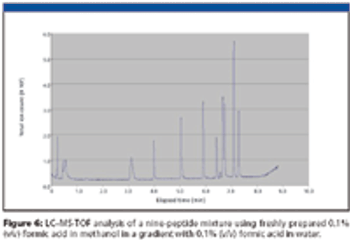
LCGC North America
John Hinshaw concludes his two-part series on electrical issues in the laboratory.

LCGC North America
John Hinshaw concludes his two-part series on electrical issues in the laboratory.

LCGC North America
Agilent Technologies (Santa Clara, California) and the University of Technology Sydney (UTS, Sydney, Australia) have established the UTS Elemental Bio-Imaging Facility to study trace metals and other elements in tissue and their effects on health.

LCGC North America
A number of commercial in-solution, and in-gel IEF fractionation systems are described in this month's column.

LCGC North America
Ron Majors continues his summary of the technical highlights of HPLC 2008, discussing more hot topics from the show.

LCGC North America
Torion Technologies, Inc. (American Fork, Utah), a manufacturer of automated miniaturized, hand-portable GC and toroidal ion trap mass spectrometry (TMS) technology, has announced a partnership with Smiths Detection (Danbury,Connecticut), part of the global technology business, Smiths Group, and a technology developer and manufacturer of sensors that detect and identify explosives, chemical and biological agents, weapons, and contraband.

LCGC North America
A novel method that significantly improves the accuracy and reliability of "unknown" compound identification for volatile organic compounds by GC-MS is described.

LCGC North America
John Dolan regularly receive e-mails from readers with a wide variety of questions. As he cleans out his inbox, he chooses a few of these to share.

LCGC North America
Despite a recent history of major innovation in many areas of the market, the position of mass spectrometry as one of the most powerful analytical techniques available, and the cutting edge applications in which it is used seem to drive the continuation of such a rapid pace of innovation and breakthroughs.

LCGC North America
The Pittsburgh Conference (Pittsburgh, Pennsylvania) has announced that George M. Whitesides, the Woodford L. and Ann A. Flowers University Professor of the Department of Chemistry and Chemical Biology at Harvard University (Cambridge, Massachusetts), will be the Plenary Speaker at Pittcon 2009 on March 8, 2009.

LCGC North America
Thermo Fisher Scientific (Waltham, Massachusetts) has received a Microsoft Corporation 2008 Pharmaceutical and Life Sciences Innovation Award in the Discovery and Product Innovation category.

LCGC North America
Dilute formic acid solutions in methanol were found to decline in acid content with time, the extent of the decline depending upon the initial amount of water present in these solutions. The effect of the formic acid concentration change upon the separation of peptides using high performance liquid chromatography (HPLC) is examined briefly.